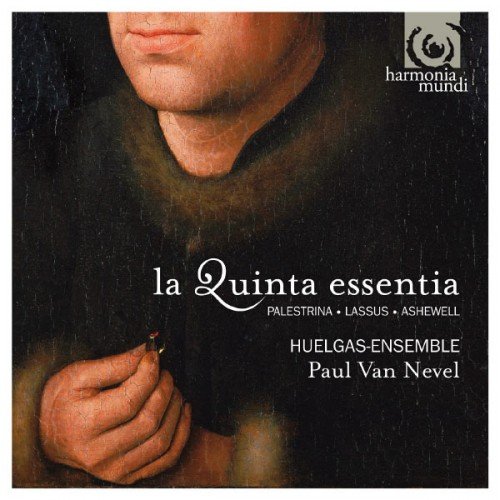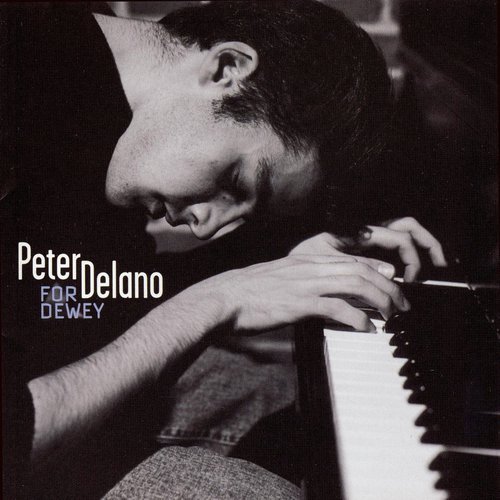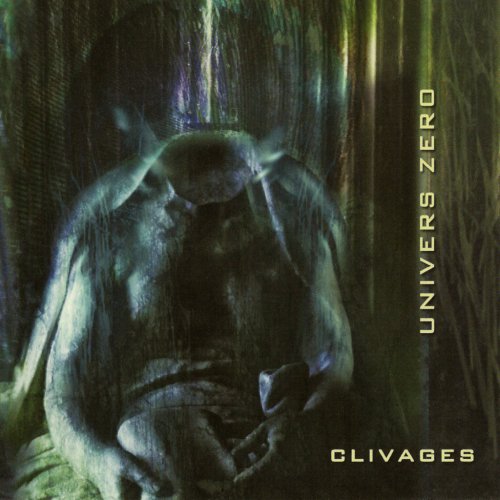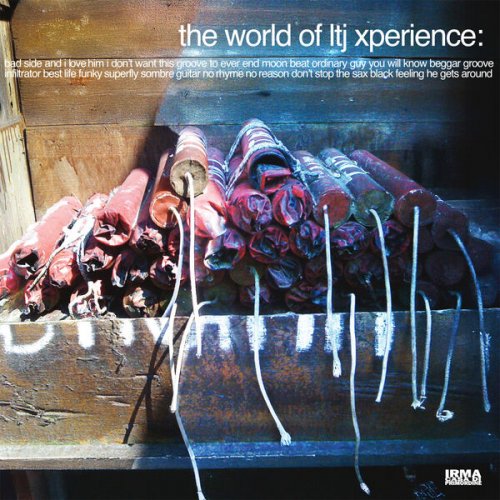Huelgas Ensemble & Paul Van Nevel - La Quinta Essentia (2007)

Artist: Huelgas Ensemble & Paul Van Nevel
Title: La Quinta essentia (Palestrina, Lassus & Ashewell)
Year Of Release: 2007
Label: Harmonia Mundi
Genre: Classical
Quality: FLAC (tracks + .cue)
Total Time: 77:16 min
Total Size: 322 MB
WebSite: Album Preview
Tracklist:Title: La Quinta essentia (Palestrina, Lassus & Ashewell)
Year Of Release: 2007
Label: Harmonia Mundi
Genre: Classical
Quality: FLAC (tracks + .cue)
Total Time: 77:16 min
Total Size: 322 MB
WebSite: Album Preview
Missa Tous les regretz, for 6 voices, H. v/3
01. Kyrie (3:10)
02. Gloria (4:37)
03. Credo (7:27)
04. Sanctus (3:25)
05. Agnus Dei (3:39)
Missa Ave Maria, for vocal ensemble
06. Gloria (7:44)
07. Credo (9:44)
08. Sanctus (8:14)
09. Agnus Dei (8:06)
Missa Ut re mi fa sol la, for 6 voices
10. Kyrie (3:47)
11. Gloria (4:07)
12. Sanctus (6:47)
13. Agnus Dei (6:30)
Paul van Nevel is unquestionably one of the mainstays among artists who specialize in gothic and Renaissance choral music. Having founded the Huelgas Ensemble in 1971, his catalog of recordings begins in the late '70s when his group was recording for the Belgian labels; one of the few early music specialists from his time still active, van Nevel just gets better and better. After a long association with Sony Classics, van Nevel landed with Harmonia Mundi and has been recording for the label since 2002; while the quality of his output remained high, it seemed to fall a bit short of the standard of his last Sony efforts, for example Mattheus Pipelare: Missa L'homme Armé or Alexander Agricola: A Secret Labyrinth. Although his and Huelgas' 2004 disc of Alfonso Ferrabosco comes close, nothing van Nevel has done for Harmonia Mundi thus far approaches the exalted level of La Quinta essential, in which van Nevel has clearly regained his stride; it is a milestone in his career and that of Ensemble Las Huelgas.
The premise of La Quinta essential is relatively simple: illustrate the different angles of the sixteenth century by drawing together three mass settings from composers with different points of view, in this case Lassus, Palestrina, and mega-obscure Englishman Thomas Ashewell, whose extant catalog of works runs to two items. None of these works can be termed being particularly well known; Palestrina's Missa Ut re mi fa sol la has been recorded two or three times, Lassus' Missa "Tous les regretz" one other time, and Ashewell, never. The performances by Huelgas are seamless and seemingly definitive; however, the most striking thing is how successfully van Nevel is able to parse out what makes these three works so different. Palestrina achieves a crystal-clear transparency under his direction, and as you listen to the conclusion of the Agnus Dei you might not be blamed for thinking you are in the presence of God; its transcendent beauty takes the listener apart piece by piece. It is not unlike the scene in The Little Flowers of St. Francis where the saint converses with the heavens as a jealous monk looks on. However, not all of us like to be in the glare of God's presence all the time, and that's where Lassus comes; his mass is worldly, studied, and evokes the chambers of the Royal courts where it was likely first heard -- this is the music of kings, princes, dukes, and other noblemen. It may not have divinity, but it has power.
Ashewell is earlier than the other composers by at least a half century, and his work retains a conspicuous amount of gothic practice; although he was certainly aware of Dunstaple, it doesn't seem as though Franco-Flemish practice affected him much, if at all. Ashewell was a man of the people; his Missa Agnus Dei seems rough hewn at first, owing to its highly plagal atmosphere and abundance of false relations. But along with its challenges, arcane style, and strangeness, there is a feeling of perfection at work in Ashewell's mass owing to his abundance of ideas and seamless way of knitting them together. The fabric may be coarse, but the garment is made well.
There is no reason Renaissance music buffs would want to avoid this release. However, for neophytes who have no understanding whatsoever as to why anyone would want to listen to music that's so old, but at least an interest in finding out the answer, van Nevel and the Huelgas Ensemble's effort is a wonderful way in the door. Music doesn't get much better than this. -- Uncle Dave Lewis
The premise of La Quinta essential is relatively simple: illustrate the different angles of the sixteenth century by drawing together three mass settings from composers with different points of view, in this case Lassus, Palestrina, and mega-obscure Englishman Thomas Ashewell, whose extant catalog of works runs to two items. None of these works can be termed being particularly well known; Palestrina's Missa Ut re mi fa sol la has been recorded two or three times, Lassus' Missa "Tous les regretz" one other time, and Ashewell, never. The performances by Huelgas are seamless and seemingly definitive; however, the most striking thing is how successfully van Nevel is able to parse out what makes these three works so different. Palestrina achieves a crystal-clear transparency under his direction, and as you listen to the conclusion of the Agnus Dei you might not be blamed for thinking you are in the presence of God; its transcendent beauty takes the listener apart piece by piece. It is not unlike the scene in The Little Flowers of St. Francis where the saint converses with the heavens as a jealous monk looks on. However, not all of us like to be in the glare of God's presence all the time, and that's where Lassus comes; his mass is worldly, studied, and evokes the chambers of the Royal courts where it was likely first heard -- this is the music of kings, princes, dukes, and other noblemen. It may not have divinity, but it has power.
Ashewell is earlier than the other composers by at least a half century, and his work retains a conspicuous amount of gothic practice; although he was certainly aware of Dunstaple, it doesn't seem as though Franco-Flemish practice affected him much, if at all. Ashewell was a man of the people; his Missa Agnus Dei seems rough hewn at first, owing to its highly plagal atmosphere and abundance of false relations. But along with its challenges, arcane style, and strangeness, there is a feeling of perfection at work in Ashewell's mass owing to his abundance of ideas and seamless way of knitting them together. The fabric may be coarse, but the garment is made well.
There is no reason Renaissance music buffs would want to avoid this release. However, for neophytes who have no understanding whatsoever as to why anyone would want to listen to music that's so old, but at least an interest in finding out the answer, van Nevel and the Huelgas Ensemble's effort is a wonderful way in the door. Music doesn't get much better than this. -- Uncle Dave Lewis
![Mama Badema Sissoko - Diamond Fingers (2026) [Hi-Res] Mama Badema Sissoko - Diamond Fingers (2026) [Hi-Res]](https://img.israbox.com/img/2026-02/14/c0n712ykaoqm3p9yoqdmhda1i.jpg)



![K.D. Lang - Ingénue (25th Anniversary Edition) (1992/2017) [Hi-Res] K.D. Lang - Ingénue (25th Anniversary Edition) (1992/2017) [Hi-Res]](https://www.dibpic.com/uploads/posts/2026-02/1771149710_cover.png)

![Momoko Gill - Momoko (2026) [Hi-Res] Momoko Gill - Momoko (2026) [Hi-Res]](https://www.dibpic.com/uploads/posts/2026-02/1770838961_a3258795048_10.jpg)

